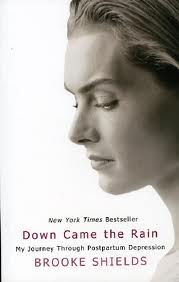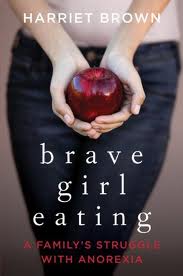
Brave Girl Eating (William Morrow, 2010) by Harriet Brown is a mother’s memoir of her daughter Kitty’s struggle with anorexia. Having read this book, I will never again look at a very thin young woman and think, “Eat a cheeseburger, honey!” Because she can’t eat a cheeseburger. She can’t eat anything without hearing voices in her head shouting louder than anything else in her world, “Bad girl!” and “If you eat that, you’ll be even uglier than you are right now,” and “If you eat that, no one will love you.”
Sound familiar?
Of course it does. Every woman in America who has ever struggled in any way with food knows all about these voices. Frankly, I don’t think a meal goes by that I don’t think this even today, even right now when I’m drinking my first cup of coffee and know for a fact exactly how many calories were in that organic raw sugar and that almond milk I stirred in there.
In fact, I was stunned to realize as I read Brave Girl Eating that Kitty’s anorexia and my endless dieting-weight-gain are not polar opposites: they are the same thing. The same “demon” (as Brown describes it) is yelling. Kitty heard it louder is all. I hear the identical voice saying the identical thing, but I eat anyway, whereas Kitty’s internal voice was so loud and fierce, she could not overcome it to feed herself.
Irrational messages: “You’re ugly” when no young woman is ugly, “You’re fat” when pictures (of Kitty) (of me at that age) show nothing of the sort, and “No one will love you” when you’re popular, cheerleading, elected to class office, on the team, being pursued by boys, and so on. These messages have no basis in fact and can be contradicted by loving parents (if they’ll take the time and effort).
Parent effort is the gist of Brave Girl Eating. Brown discusses the treatment options she had for Kitty. Doctors recommended in-patient residential settings far away from home, but Brown had no intention of sending her emotionally and physically fragile child hours away from home to hang around with other girls who were hearing the same hateful voices. She chose Family Based Therapy, and therein lies the story. I recommend this book to anyone who has encountered anorexia.
And anyone who has encountered the eating disorder many of us have been bowing down to and worshipping for decades, for almost all our lives: Restriction. “You will be holy and virtuous if you do not eat that. Better: if you do not eat, period.” The less you eat and the longer you go without eating, the better you are. Denial as holiness. Starvation as virtue.
Restriction is what anorexics do, and restriction is what many of the rest of us do. We’re just less successful. We restrict on large scale—months’ long “diets” that are nothing but unending weeks of semi-starvation where we purposefully deny our bodies nutrients they need. We “give up” carbohydrates for weeks, months, or years, because some Doctor said bacon was the way to Health Nirvana or some book told us to stop that insanity and eat no fat at all, or whatever the next craze was.
Then we wake up one day and realize that was gross—bacon is God already, fine, Facebook, you can go there with your fun memes and your bacon maple bars—but telling young women (or older women) that the things God actually designed for you to eat (potatoes, bananas, avocados, pineapples) and packaged in “Serving Size: One” portions are evil…well, we wake up from Bacon Fest and realize we’ve depleted ourselves of critical nutrition while lining our arteries with fat (“But I’m THINNER! Holy Grail Happy Dance!”). And on we go to the next nonsense, the next diet, the next folly, and the book publishers and diet-food manufacturers smile and count their money and schedule casting auditions with underweight teenage models to make us want to look like that.
Anorexia (undereating) is the same as dieting (eventual overeating) because the identical hate-voice is speaking to you. And, I am positive that the answer is the same as well: balanced, nutritional eating. Period. For year upon year. Not another “try” at restriction: “This time I’ll do better. This time I’ll be good.” “I have to lose twenty pounds before the reunion/wedding/anniversary, so I’ll just restrict this one last time.”
You know where I am going with this. Yes. It has to happen. I have to bring it around to the real evil of the Church pushing a template of wrong-headed perfectionism down hard onto adolescent women: hear no evil, speak no evil, don’t have boobs, you slut, you might accidentally (Mrs. LaHaye said this out loud to us at CHC) allow your breast to “brush” against a young man causing him to be “snared” by lust, you evil thing, you, to have a womanly body! How dare you have hips that move! Clench that gluteus, walk straight, don’t sway! A half-inch of cleavage, oh my GOD! (Those of us with D-cups in college were probably seen as per se evil, never mind our purity, virginity, and naivete.)
The root of these illnesses/conditions/lifestyles is perfectionism. You know who you are and where yours came from. Mine arose out of innate ability. You can, so you should, dontcha know. I was told by more than one person in my teenage years: “You have the ability to get As, so Bs are sins for you.” Remember that verse, “Whatever is not of faith is sin”? How has that been twisted, abused, and used as a bludgeon? It’s a sin to get a B, to show cleavage, to have a Bible when they don’t in Cambodia (hurry, memorize it all, the Russians are coming to take it away!), to have hips when women in Africa are skin-and-bones. Let’s try to be skin-and-bones then to be more holy. Makes sense, right?

Anyway, you’re sinning if you don’t get an A on your Algebra test, never mind you don’t understand Algebra and Mr. Erickson is drawing basketball plays on the board because the student aid sitting in the back of the classroom is on the team and Erickson just got a cool idea for tonight’s game against Valley.
You’re sinning if you’re not in the dead center of God’s will or the exact middle of the “ideal weight” table. In my high school years, you were also sinning if you didn’t wear the right “season” colors. Remember that foolishness? I was an autumn (kill me), so I “had” to wear browns and olive and avocado and harvest gold, the kitchen appliance colors of the 70s.
Real avocados, however, were of the devil (so much fat!), but Atkins was God, so we ate bacon and hot dogs and hamburger patties slathered with mayo and slabs of cheese, and if we were “good” we could add a side of cottage cheese on Friday. Kid you not. I weighed 130, but there were little girls in my grade who were under 100, so I was super fat, out of God’s will, and sinful. (They probably hadn’t started to menstruate yet, weren’t yet women.)
So we learned to restrict. I fasted for the first time in eighth grade (I was 115–super fat!). Two solid days sans food. I’m not going to go into a play-by-play here of my four decades of dieting (read: the “heads” side of the restriction coin if anorexia is the “tails” side). Suffice to say that I learned oranges were of the devil in the third grade because they had carbs and carbohydrates (designed by God for the nourishment of the human body) were innately evil and to be avoided. Pictures of me at eight years old do not show an obese child.
I am fat now (by anyone’s understanding. I weigh about 70 pounds more than I did when I thought I was–but wasn’t–super ugly and fat in college), and am only now learning that restriction is disordered eating. That when Paul said, “I put my body under” he didn’t mean young women should forego feeding themselves in order to conform to an image of thinness ordinary bodies cannot maintain without starvation.
American women should not look like concentration camp victims. Christian women should not look at food God designed for the purpose of feeding them and call it evil or sinful. Calling good evil and evil good is something we need to struggle against, not something we should embrace.
I digressed a lot here from the book because of how the book spoke to me in my struggle, but I don’t want to digress so much that the message of Brave Girl Eating is lost on any readers: Anorexia is an illness, not a choice. It is not something to be envied or desired or joked about. This is not funny:

Anorexia is a cruel and brutal task-master that often leaves corpses in its wake. We need to keep our eyes open to see if the young women under our care (and, though far less often prey to this illness, young men) are restricting their eating to less than normal or less than balanced or less than regular.
I could write a book on my eating disordered (restrict-eat-restrictsomemore-eatmore-fast-eateateat-feel gross-hate self) life, but it’s embarrassing and would make me oh-so-vulnerable to people saying stupid and unhelpful things (Why don’t you just be like me? I always knew you were disordered. Who thinks like you, you freak? I always knew you were great, why did you hate yourself so much?) and more inner-voice shouting: Why are you talking about eating, fatso? Who would listen to a fat woman like you? Why don’t you Atkins it up for a few months so you can at least not look like a whale when you talk about eating? and so forth.
Maybe I’ll do it anyway. Damn the inner voice that tells me I’m ugly and unlovable and unworthy, and down with people who think it’s their business to tell me I’m fat, as if I don’t have a mirror, a scale, and size 22 jeans hanging in neat rows in my walk-in closet. You want me to tell you your failings? Why you’re sinning?
Pass the avocado. Give me some bread. I’m hungry so I’m going to eat. (A fat woman even saying she’s hungry is seen as disgusting in our culture. How dare she have a functioning digestive system?) No more I’m hungry so I’m going to not eat because when I feel that empty feeling I feel virtuous and good. Equating physical pain with spiritual virtue is (hear me) a very serious problem. We need to address that as American Christian women. We need to not put our own daughters through this hell. We need to love ourselves enough to climb out.
(Pushes “publish” with the real fear that people will say, “What are you talking about? I don’t understand you? I never felt like that ever and don’t know anyone who did.” Which is why, of course, there are ten zillion dollars a year spent in The Diet Industry–because women feel so beautiful and normal and empowered in their bodies.)






